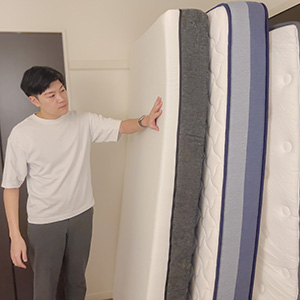Mattress thickness varies depending on the type of mattress, from thin to thick. Thin mattresses are only about 2-5cm thick , while thick mattresses can be over 30cm thick.
Of course, the thickness of the mattress affects the comfort of sleeping, and it is common to use different thicknesses of mattresses depending on the purpose and use.
For example, a thin mattress (less than 5cm thick) is used in combination with a thick mattress. It is placed on top of the mattress to improve comfort, and is generally called a "mattress topper."
If your mattress is too hard or has worn out, you may be able to adjust the firmness to your liking by using a mattress topper. They are available at reasonable prices, making them a more convenient way to improve your sleeping comfort than buying a new mattress.
Medium-thickness mattresses can be used alone and have the advantage of being compact and lightweight, making them easy to care for. They are also convenient for those who move or carry around a lot. Some medium-thickness mattresses are foldable, so they can be stored when not in use.
The biggest advantage of a thick mattress is its comfort. It also has increased durability, so it's recommended for those who want a high-quality mattress that can be used for a long time. However, the thicker the mattress, the more expensive it is, so you'll need to consider your budget. Also, as the mattress gets thicker, it becomes heavier. Daily maintenance is more difficult, so you need to be careful about the growth of mold and dust mites.

















